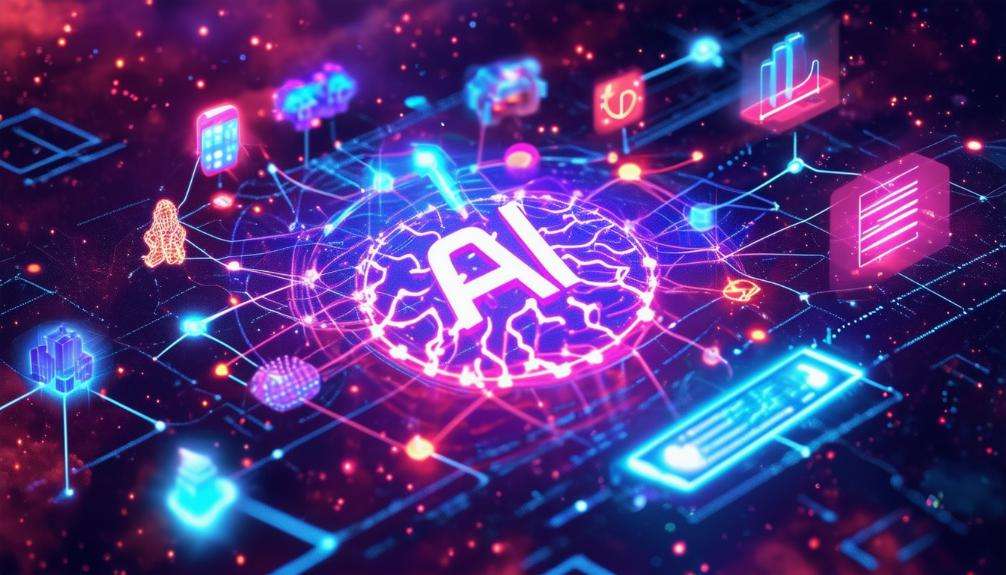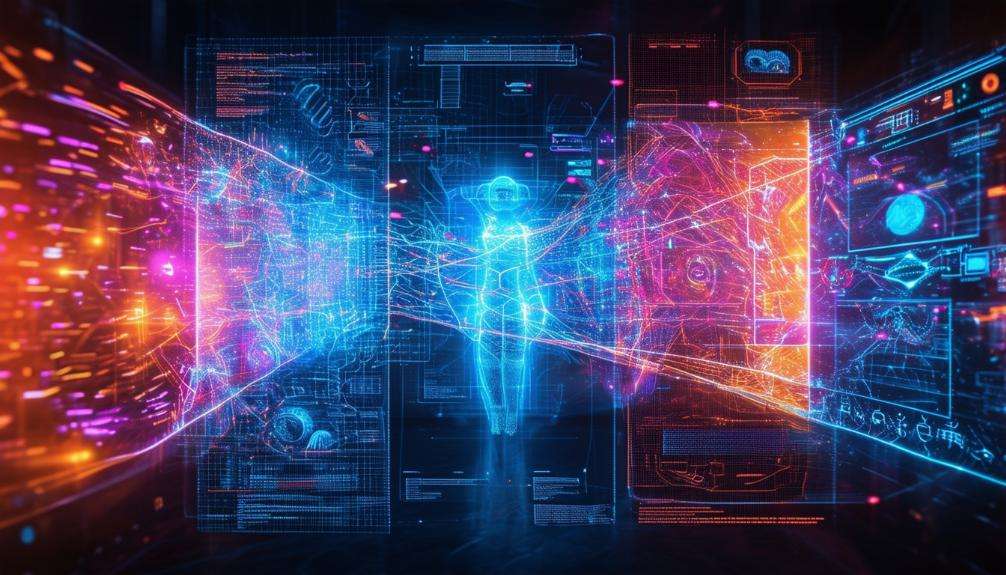Table of Contents
I've stumbled upon a fascinating array of AI tools that are reshaping how we create and develop. Story Diffusion turns written narratives into visual stories, generating images, videos, and comics from text prompts. It's revolutionizing visual storytelling. AI is also making waves in music production and coding, helping with sound effects and code development. On the open-source front, there are innovative tools for developers, trending resources across tech domains, and cutting-edge solutions. These AI-powered tools are transforming narratives across industries, empowering creators in new ways. The future of content creation is looking increasingly AI-driven and exciting.
Main Talking Points
- Story Diffusion transforms written narratives into visual stories using AI-generated images and videos.
- AI-powered sound effect generators assist with audio production for films and video games.
- Code assistants provide programming support and enhance software development workflows.
- AI tools revolutionize music production by offering creative assistance and automation.
- Open-source AI projects offer innovative tools and resources across various technological domains.
AI-Powered Content Creation
AI-powered content creation tools are transforming how we produce visual stories, music, and code. I've seen firsthand how these innovative solutions are revolutionizing creative and technical fields.
Take Story Diffusion, for instance. This platform uses advanced AI to turn written narratives into enthralling visual stories, generating images, videos, and comics from text prompts. It's a game-changer for consistent visual storytelling.
But it doesn't stop there. AI tools are also making waves in music production and coding. They're generating sound effects, assisting with code development, and empowering creators across various industries.
As a content creator myself, I'm amazed by how these tools enhance my workflow and expand my creative possibilities. They're not just making our jobs easier; they're opening up new avenues for expression and innovation that were previously unimaginable.
Innovative Open Source Tools

Open source tools are pushing the boundaries of innovation, offering developers and tech enthusiasts a wealth of cutting-edge resources.
I've recently explored some exciting projects that caught my attention. Zig Open Source Projects are introducing innovative tools for developers, while Trending Open Source Tools provide valuable resources across various tech domains. I'm particularly intrigued by New Open Source Projects that are introducing cutting-edge solutions for different sectors.
For those looking for practical applications, I've found Seven Open Source tools that offer great functionality. These projects demonstrate the power of collaborative development and freely shared knowledge.
As an AI enthusiast, I'm excited to see how these tools will shape the future of technology. Whether you're a seasoned developer or just starting out, there's something for everyone in the world of open source innovation.
Transforming Narratives With Technology

Several cutting-edge AI tools are revolutionizing how we create and share stories, blending technology with narrative art in unprecedented ways. I'm particularly excited about Story Diffusion, which transforms written narratives into visual stories using advanced AI. It's incredible how it can generate images, videos, and comics from text prompts, offering consistent visual content for storytelling.
Here's a quick look at some AI tools transforming narratives:
| Tool | Function | Application |
|---|---|---|
| Story Diffusion | Text-to-visual conversion | Storytelling |
| AI Sound Effects | Audio generation | Film and gaming |
| Code Assistants | Programming support | Software development |
These AI solutions are empowering creators across various industries, from content creation to coding and music production. As an author, I'm fascinated by how these tools are reshaping the landscape of creative expression, offering new possibilities for bringing our stories to life.
Frequently Asked Questions
How Do AI Tools Impact Job Security in Creative Industries?
I believe AI tools have a vital impact on job security in creative industries. They're transforming how we work, making some tasks more efficient but also potentially replacing certain roles.
I've seen AI generate content, design graphics, and even compose music. While this can be concerning, I think it's essential to adapt and learn to work alongside AI.
It's not about replacement, but augmentation – we need to evolve our skills to stay relevant.
What Are the Ethical Considerations When Using Ai-Generated Content?
I believe the ethical considerations when using AI-generated content are intricate. We must address issues like copyright, attribution, and authenticity.
There's a risk of plagiarism and misrepresentation if we don't disclose AI involvement. We should also consider the potential impact on human creators' livelihoods.
It's essential to maintain transparency about AI's role and guarantee fair compensation for original work. We can't overlook the need for guidelines to protect intellectual property and preserve human creativity.
Can AI Tools Be Customized for Specific Industry Needs?
Yes, AI tools can definitely be customized for specific industry needs. I've seen countless examples of AI being tailored to various sectors. From healthcare AI that assists in diagnostics to financial AI that predicts market trends, there's no limit to customization.
Companies often work with AI developers to create bespoke solutions that address their unique challenges. This adaptability is what makes AI so powerful – it's not a one-size-fits-all technology, but a flexible tool that can be molded to fit any industry's requirements.
How Do AI Tools Handle Copyright and Intellectual Property Issues?
I'll address how AI tools handle copyright and intellectual property issues.
It's a complex area that's still evolving. Many AI companies train their models on publicly available data, which can raise questions about copyright. Some tools have built-in safeguards to avoid direct copying, while others rely on user discretion.
There's ongoing debate about whether AI-generated content can be copyrighted. It's essential for users to understand the terms of service and potential legal implications when using these tools.
What Level of Technical Expertise Is Required to Use These AI Tools?
I'd say the level of technical expertise needed for AI tools varies widely. Some are user-friendly and require minimal tech knowledge, designed for beginners.
Others might demand more advanced skills, especially in coding or data analysis. However, I've noticed a trend towards making AI tools more accessible.
Many now come with intuitive interfaces and tutorials. It's often a matter of willingness to learn rather than extensive technical background.
I'd encourage anyone interested to give them a try.
Conclusion
I'm continually amazed by the rapid advancements in AI tools. They're reshaping how we create, code, and innovate across various fields.
As I've explored these technologies, I've seen their potential to democratize creative processes and boost productivity. Whether you're a professional or hobbyist, there's an AI tool that can enhance your work.
I'm excited to see how these tools will continue to evolve and what new possibilities they'll reveal in the future.
